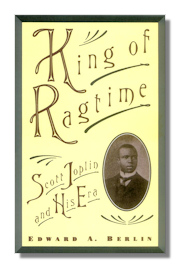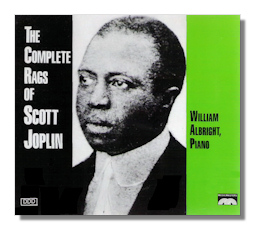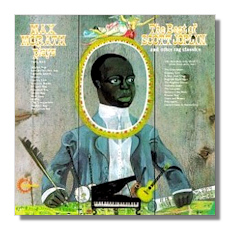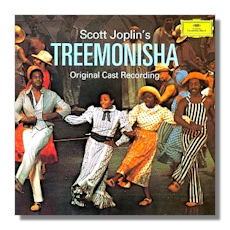
The Internet's Premier Classical Music Source
Related Links
- Recommended Recordings
Recommended Biographies
Recommended Scores
CD / DVD Reviews - Joplin Works List
by Ed Berlin - Audio Samples:
 (MIDI)
(MIDI) - The Entertainer
-
Find CDs & Downloads
Amazon - UK - Germany - Canada - France - Japan
ArkivMusic - CD Universe
Find DVDs & Blu-ray
Amazon - UK - Germany - Canada - France - Japan
ArkivMusic-Video Universe
Find Scores & Sheet Music
Sheet Music Plus -
- Joplin Page by Nathan Cranford
- Ragtime Home Page
Recommended Links
Site News
Scott Joplin
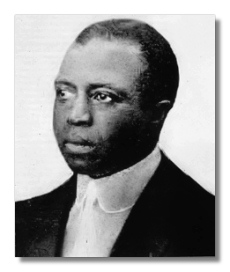
(c.1867 - 1917)
Alfred Ernst, director of the St. Louis Choral Symphony Society, declared in 1901 that ragtime composer Scott Joplin was a genius. He further described Joplin's enthusiasm for the music of Wagner. Two years later, an interviewer wrote that Joplin "affirms that it is only a pastime for him to compose symcopated music and that he longs for more arduous work." Joplin was then completing his first opera.
Scott Joplin made his name as "The King of Ragtime Writers," but his success in writing popular, syncopated piano pieces did not satisfy him. He aspired for success as a composer for the serious, lyric stage.
Many (though by no means all) turn-of-the-century writers categorized music according to a strict scale of values: classical music was the "best" music, having excellence that was moral as well as artistic. Opera was at the very peak of this scale. Ragtime, which was perceived as having African American origins, was placed at the bottom. Opponents of ragtime claimed that the music not only lacked artistic merit; it was harmful, as well, to listeners' intellectual, moral, and physical well-being.
Joplin naturally did not subscribe to such sentiments. However, he realized that ragtime would never bring him the artistic respect that he desired. His musical interests were also considerably broader than what could be expressed in ragtime. He therefore composed two operas, a ballet, and two orchestral works (a symphonic poem and a piano concerto, both of which are lost).
He never achieved, during his lifetime, the artistic recognition he sought. And even in ragtime, his success was limited. His "Maple Leaf Rag" was the most popular instrumental rag of the period, but few of his other works were well-known (although many were admired, and copied, by other composers).
Joplin was born in east Texas between July 1867 and January 1868. (Census records and his death certificate indicate that the often-cited date of November 24, 1868 is incorrect.) His father had been a slave, his mother was a free-born black woman. Early in Joplin's childhood, the family moved to Texarkana, living on both the Texas and Arkansas sides. His father worked as a laborer and his mother did domestic work. Both parents were reputed to have been musical, and two of Joplin's five siblings (Robert and Will) became musical performers.
The young Scott had access to a piano in a white-owned home where his mother worked, and taught himself the rudiments of music. (Paying tribute to his mother's efforts that enabled him to start his musical education, he has the heroine of his opera "Treemonisha" obtain education through her mother's labors in a white-owned home.) His talent was noticed by a local, German-born music teacher (probably Julius Weiss), who further taught him music, with a special emphasis on opera and other European art forms. Joplin maintained a correspondence with this man during his entire life.
Early in Joplin's professional career he was a singer with vocal groups, a performer on several instruments (piano, cornet, violin), and a member of a minstrel troupe. We do not know when he began composing, but his first publications were parlor songs, issued in Syracuse, NY, while he was touring with his Texas Medley Quartette in 1895. He had just moved to Sedalia, Missouri, where soon afterward he attended the George R. Smith College, and worked as a musician.
Ragtime emerged in the early 1890s and became known to the wider public at the world's fair held in Chicago in 1893. (During the fair, Joplin worked with a band, playing cornet, outside the midway.) The first publications of instrumental ragtime came in 1897. Joplin's first rag publication was "Original Rags," issued in 1899 by Carl Hoffman, a Kansas City firm. The cover says the music was arranged by Chas. N. Daniels, and the music was copyrighted and advertised as Daniels' composition. Afterward, Joplin was more careful in his dealings with publishers.
Later that year, he met John Stark, a music dealer and small publisher in Sedalia. He arranged to have Stark publish "The Maple Leaf Rag," and had a lawyer draw up a royalty contract. The unprecedented success of this piece brought Joplin fame, and the royalties, though not overly substantial, eased the financial side of his life. (It also changed Stark's life, and he advertised his successful publishing business as "The House of Classic Rags." Stark, whose daughter Eleanor was a concert pianist and one-time student of Moritz Moskowski, maintained that the rags he issued were equal artistically to the the best classical music.)
In 1901, Joplin and his new wife Belle moved to St. Louis. There, he devoted his time to composing and teaching. He did little performing, for though he was acclaimed as a pianist in the town of Sedalia, he could not compete with the more skillful ragtime musicians in St. Louis. He was acquainted with them, however, and pianist-composer Tom Turpin, whose Rosebud Saloon was a major meeting place for ragtimers, was one of his closest friends. Another close friend was the brilliant, short-lived, pianist-composer Louis Chauvin, whose sole ragtime publication was written in collaboration with Joplin, the hauntingly, beautiful "Heliotrope Bouquet."
It was while in St. Louis that Joplin met with conductor Alfred Ernst, possibly through an introduction by his publisher's daughter Eleanor. We know little of what transpired between Ernst and Joplin, but by the end of 1901 or early in 1902 Joplin began work on his first opera: "A Guest of Honor." The story commemorates an incident that both enraged and thrilled significant parts of America: President Theodore Roosevelt's dinner invitation, in October 1901, to black leader Booker T. Washington.
Joplin filed an application with the Copyright Office in February 1903, but did not send the score along; he was anticipating its publication by Stark. He formed a company and rehearsed the opera the following summer, and began a tour in late August. Theater bookings were made for September and October in towns in Illinois, Missouri, Kansas, Iowa, and Nebraska, but most were not filled. Someone associated with the company stole the box office receipts early in September, and the company disbanded. The music was never published, and the score was lost, supposedly destroyed when Joplin could not pay the boarding house bill for his troupe.
Joplin had lost most of his money on the aborted tour, and his marriage to Belle had also ended. Early in 1904 he returned to Arkansas to visit relatives. There he met a 19- year-old woman named Freddie Alexander, to whom he dedicated "Chrysanthemum," a rag bearing the subtitle "An Afro-American Intermezzo." They were married in June 1904, and then journeyed to Sedalia. Along the way, Freddie became ill, and was bedridden when they arrived in July. Two months later, in September, she died of pneumonia.
Though Joplin was to have yet one more marriage (Lottie, possibly in 1913), he was haunted by memories of his young, departed bride. It is possible, though by no means certain, that his first publication in 1905, the syncopated waltz "Bethena," bears her wedding photograph on its cover. His opera "Treemonisha," completed six years later, is set in Arkansas in September 1884, the month of Freddie's birth.
Joplin went to New York in 1907 in an effort to find a backer and publisher for the opera on which he was then working. He tried several new publishers, settling for awhile with Seminary Music, which published such favorite works of his as "Pine Apple Rag" and "Solace." In 1908, the owners of Seminary established another publishing firm, Ted Snyder Music, where a young Irving Berlin was hired as staff lyricist and occasional composer. Joplin claimed in 1911 that he brought the score of "Treemonisha" to Berlin in an attempt to have it published. Berlin turned it down, but several months later published his own, fabuously successful "Alexander's Ragtime Band," in which the verse resembles music in the "A Real Slow Drag" section of "Treemonisha." Two months later, Joplin published "Treemonisha" at his own expense, after first altering the "stolen" theme of "A Real Slow Drag."
Following the example of Wagner, Joplin wrote the libretto for this opera (as he had for his first). There are obvious autobiographical references to his mother, to his wife Freddie, and to the music of the rural Arkansas in which he was raised. The opera's story is of Treemonisha, a young woman who, through her education, is able to lead her townspeople out of the dual enslavements of ignorance and superstition. For Joplin, this was an allegory for the plight of African Americans and what he perceived as the solution.
In June 1911, a full-page review of the score of "Treemonisha" appeared in the magazine "American Musician and Art Journal." The writer praises Joplin's opera and says it is far more American in character than Horatio Parker's "Mona," which had just won a $10,000 prize for American opera from the Metropolitan Opera Company.
Thereafter, most of Joplin's energies were devoted to arranging a performance of his opera. There were several scheduled stagings, but none were realized. He composed other music (rags, songs, and longer works), but few were published. (His unpublished manuscripts were noted in court records as late as 1961, but have since disappeared.) He suffered from tertiary syhilis the last years of his life, and his health deteriorated quickly. He was hospitalized in January 1917, transferred to a mental institution, and died April 1.
Joplin was mostly forgotten by the time he died. "The Maple Leaf Rag" was performed by following generations of jazz musicians, but few of Joplin's other pieces remained in the repertory. He knew that his music was not appreciated, but predicted that recognition would come a quarter-century after his death. His prediction was amazingly close.
The revival began in 1941, with performances by the Yerba Buena Jazz Band, a San Francisco group intent upon finding jazz's roots. The first article about him appeared in 1944, and in 1950 there was a biography in Rudi Blesh and Harriet Janis's "They All Played Ragtime." This book helped to spur interest, and ragtime fan clubs emerged in the 1950s and 1960s. In the late 1960s composer Bill Bolcom became acquainted with the music and with Blesh, and he spread the word among his colleagues, some of whom were inspired to try their own hands at ragtime.
The various trends in the revival coalesced in the early 1970s.
- Joshua Riffkin's recording of Joplin rags on Nonesuch Records, a classical label, became a "classical" best-seller.
- The New York Public Library issued a two-volume collection of Joplin's music, thereby giving the stamp of approval of one of the nation's great institutions of learning.
- "Treemonisha" received its first full staging, as part of a Afro-American Music Workshop at Morehouse College, in Georgia.
- Gunther Schuller, president of the New England Conservatory of Music, led a student ensemble in a performance of period orchestrations of Joplin's music.
- Inspired by Schuller's recording, the producer of the movie "The Sting" had Marvin Hamlisch score Joplin's music for the film, thereby bringing Joplin to a mass, popular public.
The result was that Joplin's music suddenly achieved unprecedented popularity, being performed both by popular artists and in concert by classical performers. This was a music that could be appreciated by everyone, and Scott Joplin's faith in himself was vindicated. ~ Copyright © 1996, Edward A. Berlin
Additional Reading:
Edward A. Berlin, King of Ragtime. Scott Joplin and His Era (Hardcover - New York: Oxford Univeristy, 1994; Paperback - New York: Oxford Univeristy, 1996)
Recommended Recordings
Piano Music
- Complete Rags of Scott Joplin/MusicMasters 7061-2-C or Musical Heritage Society 522771H
-
William Albright (piano)
- The Best of Scott Joplin/Pro-Arte CDD397 or Fanfare CDD-562
-
John Arpin (piano)
- Euphonic Sounds - The Scott Joplin Album/Omega OCD3001
-
William Bolcom (piano)
- Piano Works (1899-1904)/RCA Victor Gold Seal 7993-2-RG
-
Dick Hyman (piano)
- The Best of Scott Joplin/Vanguard VCD-3940
-
Max Morath (piano)
- The World of Scott Joplin, Vol. 1 & 2/Vanguard VMD-310 & VMD-351
-
Max Morath (piano)
- Piano Rags/Nonesuch 979159-2
-
Joshua Riffkin (piano)
- The Complete Scott Joplin, Vol. 1-4/Greener Pastures GPR-002, GPR-004, GPR-006, GPR-007
-
Scott Kirby (piano)
"Treemonisha" (opera)
- Treemonisha/Deutsche Grammophon 435709-2 reissued as 4775590
-
Cora Johnson (soprano), Carmen Balthrop (soprano), Betty Allen (mezzo soprano), Curtis Rayam (tenor), Ben Harney (baritone), Willard White (bass), Raymond Bazemore (bass), Gunther Schuller/Houston Grand Opera Orchestra & Chorus














